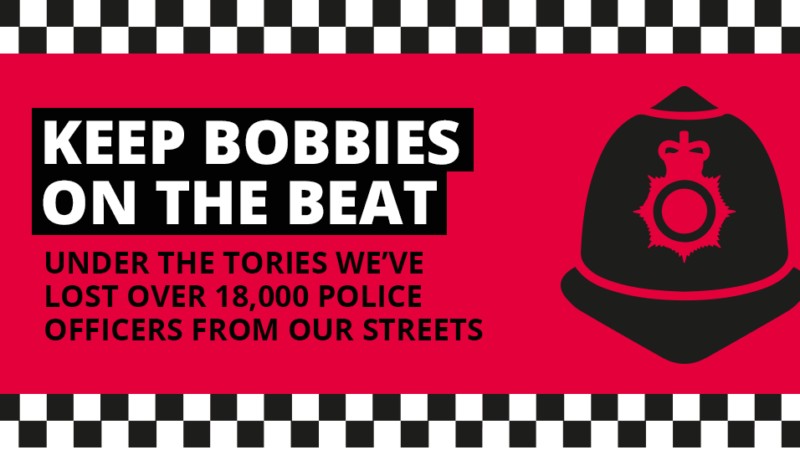
The desire to appear more trustworthy to voters on law and order runs like a golden thread through the Labour Party’s campaign efforts. Tony Blair famously ran on the slogan ‘tough on crime, tough on the causes of crime’, and now Jeremy Corbyn’s Labour has been keen to establish a link between Tory police cuts and the disintegration of communities.
Police funding became a key battleground in the 2017 general election. In its manifesto, Labour promised to recruit 10,000 more police officers for the community beat and to support the police in the performance of their duties. The theme resurfaced again during the European elections. Although the European parliament has no powers over police funding in the UK, recruiting 10,000 more cops made it onto our campaign literature as a central pledge – in the first draft of the leaflet, the pledge was even placed ahead of a commitment to a referendum on any Brexit deal.
Most recently, Labour’s candidate for the Peterborough by-election Lisa Forbes posted a campaign video on social media in which she spoke about wanting to make the city safer with more funding to get bobbies back on the beat. Again, the argument was made that an increased presence of police on the street leads to safer communities.
Crime and law and order are traditionally areas where Labour performs weaker than the Conservatives. Given that these issues are often high up on voters’ list of concerns, Labour is understandably keen to make a connection between Tory austerity and cuts to public services that make voters feel less safe.
But all too often discussions around crime overlook the needs of the communities worst affected by austerity and are driven by reactionary views on law and order. Stop and search is a good example. The Home Secretary Sajid Javid announced in March that police in England and Wales will be given more power to stop and search people without reasonable suspicion in an attempt to tackle knife crime. The practice disproportionally targets black communities, and research has cast doubts over it having any real impact. Yet politicians continue to champion it and the police increasingly use it.
Labour is well-placed to argue that simply putting more police officers into neighbourhoods to patrol the area is not actually the most effective use of public money. The leadership could assert that we should instead invest in services, and tackle some of the underlying factors that can contribute to crimes.
Labour could work to shift the debate on crime away from police presence and towards prevention, proudly making the case for spending on public services – such as healthcare and education – as an investment in our communities. And as socialists, we should go even further: kick-start a critical discussion of the role of the police, its powers and its relationship to the state.
Corbyn’s biggest achievement as Labour leader so far is probably the development of a critique of neoliberalism and austerity in mainstream British political discourse. However, a discussion around the institutions that uphold the oppressive structures of capitalism is missing from our political offer.
The police represent the civil authority of government. When the interests of the people are not aligned with the interest of government, the police will be deployed to break up disobedience.
The miners’ strike is one example where legalised state violence was used to beat workers into submission. The Battle of Orgreave was one of the most violent clashes in British industrial history and the intimidation tactics used by the Thatcher government became a turning point for militant trade unionism in Britain.
There’s also the spy cops scandal, which saw undercover police officers infiltrate left-wing and progressive movements. Among those targeted by the police were anti-fascist and anti-racist networks, environmental activists and animal rights groups.
The people are demanding radical change from our political leaders. Climate change and the rising tide of right-wing populism has meant that civil society is organising in social movements again. But climate breakdown can only be stopped if we completely transform the way we live, produce and consume – which means explicitly challenging current economic power structures.
The powerful are naturally suspicious of those who question the status quo. It is not difficult to imagine that those who gain from the current economic settlement will want to protect their wealth and might use the force of the state to crush those movements.
We have already seen criminalisation of activists by the state – be it anti-fracking protesters, migrants rights’ activists like the Stansted 15 in Britain, or civilian volunteers rescuing refugees from drowning in the Mediterranean. If we truly want to carry out a transformative programme. Labour must cultivate an awareness of the powers of the police and the state among its activists that goes beyond electoral point-scoring.




More from LabourList
Supreme Court trans ruling: Ban on CLPs and branches backing ‘unlawful position’
‘How we can build a strong political centre and centre-left’
‘Building the UK’s best network: delivering digital opportunity for every community’